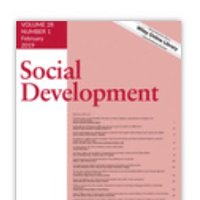
Social Development
@socdevjournal
Dealing with all aspects of children's social development as seen from a psychological stance
ID: 3384654430
http://onlinelibrary.wiley.com/journal/10.1111/(ISSN)1467-9507 20-07-2015 15:04:48
379 Tweet
657 Followers
346 Following

New from Janet Boseovski, PhD 🇨🇦 🇲🇰 🇺🇸 🏋️♀️🏃♀️ and colleagues! Chinese children judged positive behavior as intentional but were unsystematic in their judgments of negative behavior, suggesting connections between trait and mental state reasoning. Available open access onlinelibrary.wiley.com/doi/full/10.11…




In a study on the role of parental reflective functioning on children’s theory of mind and emotion regulation Misailidi et al found that parental prementalizing modes and curiosity about the child’s mental states uniquely influence children’s ToM and ER. onlinelibrary.wiley.com/doi/full/10.11…





Eiteljoerge et al show that infants aged between 6-15 months followed the gaze of an adult, a 5-year-old child, and an 11-month-old infant. Their gaze-following was accurate and swift with all three social partners. Dr. Sarah Eiteljörge Nivi Mani Hyowon (Hyo) Gweon onlinelibrary.wiley.com/doi/full/10.11…




New paper alert💥 Sem and colleagues show that language style matching as a novel index of parent-child behavioral synchrony that predicts inhibited children’s sociability. onlinelibrary.wiley.com/doi/full/10.11… Kathy Sem @NilaShakiba Ken Rubin Lindsay Druskin Andrea Chronis-Tuscano Nick Wagner




Out now in Social Development 🥳 New paper by Virnaliz Jimenez, M.S. shows that African American parents offer a range of suggestions to help youth think about challenging peer situations in different ways. onlinelibrary.wiley.com/doi/full/10.11…

